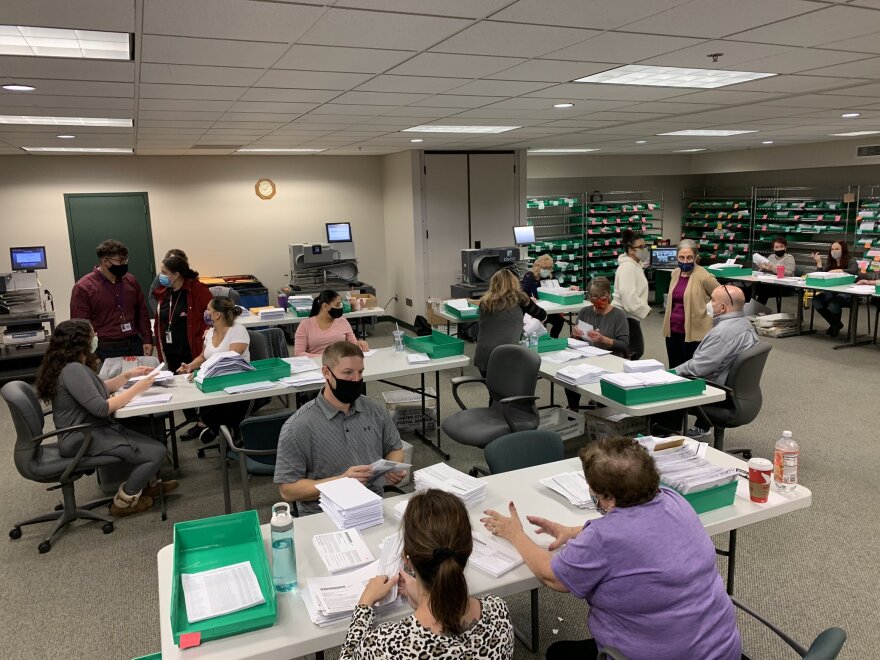ALLENTOWN, Pa. -- At 7 a.m. sharp on Nov. 8, election workers in the city and in Easton will begin the arduous process of opening and tabulating thousands of mail-in ballots.
But hundreds of those votes will be set aside uncounted.
While Pennsylvania's mail-in ballots have been a center of contention, they are still relatively new. As a result, voters frequently make errors filling them out, forcing counties to throw out the votes of otherwise eligible citizens.
"People make mistakes often," said Timothy Benyo, chief clerk of registration and elections in Lehigh County. "Not every other ballot, but maybe one out of every 100 ballots, there's something wrong with it."
The results are more of the same in Northampton County.
Becky Bartlett, the county deputy director of administration, said the county disqualified 204 ballots last November because they lacked a secrecy envelope. Also, 349 others had an error on the outer ballot; some of those could still be counted while others could not.
- Last November, hundreds of Lehigh Valley residents had their votes thrown out for failing to follow mail-in ballot laws
- Common mistakes include botching the signature or forgetting the inner secrecy envelope.
- The mistakes can have major consequences - enough to flip results in close elections.
That may not seem like much, considering the two counties saw more than 140,000 ballots cast last November, but they add up. The region saw some unusually tight races, and those ballots could have affected the outcome.
One example was a Lehigh County judicial race decided by just five votes. Republican David Ritter appealed the result to the U.S. Supreme Court, arguing hundreds of ballots lacking a date should not have been counted. The high court ultimately ruled against him, but election officials still are urging voters to date their ballots in case a future ruling reaches a different outcome.
Lehigh Valley election officials pointed to three types of common mistakes that will disqualify ballots: signature errors, naked ballots and identifying marks.
Completed ballots should have no other markings other than a voter's selections. The secrecy envelope cannot have marks on it or contain anything other than the ballot, either. A voter could violate these rules by writing his or her name in the wrong spot or accidentally sticking a note in with the ballot, Benyo said.
Once they are filled out, ballots go into a plain secrecy envelope, which then is placed in an outer mailing envelope. However, many people new to mail-in ballots miss the inner envelope. State law requires county officials to disqualify these "naked ballots."
As part of a settlement to a federal lawsuit, Lehigh County has made its secrecy envelopes yellow. The hope is the bright color will make it harder for voters to forget about, Benyo said. Philadelphia has used the practice for several years, he added.
Once both envelopes are sealed, voters are supposed to sign and date the outer envelope. But some voters overlook it or sign the wrong ballot, Benyo said. Oftentimes, he will see cases where a husband and wife inadvertently signed the other's envelope. Envelopes bearing an obviously wrong signature are disqualified and investigated in case of voter fraud.
"People make mistakes often. Not every other ballot, but maybe one out of every 100 ballots, there's something wrong with it."Timothy Benyo, Lehigh County's chief clerk of registration and elections
Some voter errors, such as signature mistakes, can be corrected. Election staff and volunteers with the two major parties try to notify voters of any issues, Benyo and Bartlett said.
While partisan and non-partisan groups are working to get people to the polls and send in their mail-in ballots, Benyo said he has a different responsibility. He needs to make sure Lehigh County holds a fair election, and sometimes that means throwing out the votes of local residents who failed to follow state law.
"My job is to count the qualified votes that are submitted," he said. "It's not really my job to have any feelings," he said.


